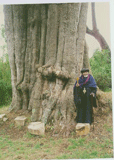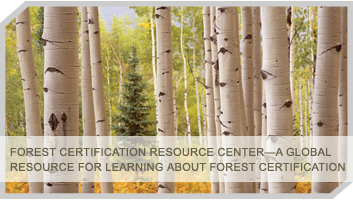Faiths and Forests
June 14 2006:
ARC is often asked to advise faiths on very practical issues such as the most appropriate paper for printing religious books on, or for magazines and correspondence by faith communities. This is why ARC was delighted to be invited by Metafore
- a group that works on making unique partnerships between environmental groups and forestry businesses - to give a presentation at their Forest Leadership Forum in Portland, Oregon in May 2006.
 |
 |
 |
Ethopian priest beside a tree protected by the Church for centuries |
The meeting brought together major forest-related businesses with environmental groups working to preserve and sustain forests. One of the key areas under discussion was the issue of what, given all the confusing choices, are the most environmental types of paper to choose?
This talk was presented by ARC's Secretary General Martin Palmer at the Forest Leadership Forum.
"In terms of forests and forestry protection, the faiths might be said to have the Four P's. Production; purchasing; preservation; persuasion.
1. Production: The faiths are often significant forest-owners. In Sweden for example 22% of commercial forestry is church-owned. In Austria, one Benedictine monastery alone owns 28% of the commercial forests. ARC is working to create a religious version of FSC which we hope by the year 2013 will be adopted by most of the religious forest owners.
2. Purchasing: The faiths are huge investors in forestry companies and forest products and increasingly they are expecting such investment to be in ethically and socially responsible companies. ARC has helped establish the International Interfaith Investment Group (3iG) which brings together heads of major religious investment funds to mutually explore taking positive investment action into SRI companies. Forestry is one of four key issues that they have already targeted. But faiths also purchase a great deal of wood and ARC has many schemes helping faiths purchase ethically and ecologically. For example, we have programmes with the major reform and Liberal Jewish communities to help them assess their purchasing of forest products; we are about to have a full commission studying the footprint of the Church of England examining all aspects of its purchasing policy in order to change this to environmentally friendly within two years; the Shinto of Japan, whose temples are all built of wood will only now use FSC certified wood for the 80,000 temples as they rebuild and renovate them.
 |
 |
 |
Forestry Resource Center: one option for learning about purchasing sustainable paper products |
The list is huge and includes discussion with the major Bible and Qur'an producers to ensure they use the most environmentally friendly paper. This is one reason I am here today - to find out what the industry and environmental movements think of this.
3. Protection: The faiths own huge swathes of the natural world and protect it. A recent study by WWF International has shown how vital sacred sites are world wide to the protection of wilderness and national parks. We have many schemes from the last remaining oak forest of Lebanon to the sacred forest of the Hindu deity Lord Jaganath in Orissa in India where faiths are working to protect forests and woodlands.
4. Persuasion: The faiths are trusted by many people above and beyond all other external organisations. Hence a message from a faith can be worth any number of Government statements or worth UN reports. Many of the faiths also have access at all levels to decision makers and ARC is a major source for feeding them information on key environmental issues which they then act on. Much of this is subtle, such as working with the Orthodox Patriarch of Moscow to persuade Vladmir Putin - an Orthodox believer - that not signing the Kyoto protocol would be wrong. In another example we were trying to persuade the British Government to change its opposition to a ban on export of toxic waste to the third world. The minister had first been Anglican and had then converted to Catholicism. We sent first a high ranking Anglican, who presented a rational, balanced, data led case. The minister nodded wisely. The other person we sent, a Catholic, basically reminded the minister that it was a sin to abuse God’s creation. The minister signed."
|

